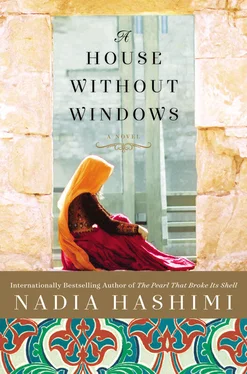“I understand. And what does Safatullah- sahib say on the matter?” Jawad took out three pens, green, black, and red. He held them up and examined their tips and then looked past them, refocusing on Gulnaz’s stoic face. She was not going to feed the feud between these two men.
“I have come for a taweez, Jawad- jan . Nothing else.”
Jawad chuckled. Jawad- jan, she’d called him. Was that out of respect or affection?
“Good,” he said, flattening the first paper square with his fingertip. “Who exactly is it that is being threatened?”
“Make me a good taweez so you and the rest of the village can never know.”
He paused for a moment, his eyes closed and his head bowed. As bewitching as she was, not every man could stomach a woman like Gulnaz. She was a bit too bold and much too clever for most. Maybe that was why her husband had disappeared. The village had a hundred stories to explain his vanishing. Jawad’s position outside the masjid put him in earshot of both the town’s synchronized prayers as well as their unsynchronized rumors. Folks couldn’t even settle on whether he was alive or dead. Jawad was relieved when he heard the first person refer to Gulnaz as a widow. It was easier on his soul to lust after the wife of a dead man.
That Gulnaz was too clever for most only excited Jawad. His life’s work, after all, had been overcoming obstacles. With his fingertip still on the square, he dragged the bit of paper to the center of the table. “I must concentrate.”
Gulnaz watched him choose the green pen. The colors of the ink were critical as were the other details that only Jawad knew. This was part of what people came for — the focus, the deliberately placed letters, the undecipherable method by which Jawad filled the tiny squares with a verse, a symbol, or a set of numbers. There was method to his magic.
Fifteen minutes later, Gulnaz, daughter to a man who despised amulets, handed a folded stack of bills to Jawad and accepted the taweez he’d written for her daughter. She tucked it into the pocket of her dress and nodded in appreciation. She felt Jawad’s smug eyes following her hips as she made her way down the hill and smiled to think she could still, after all these years, make a man look at her in that way. The hour of prayer was nearing. Gulnaz quickened her step. She hoped Safatullah wouldn’t hear about this, though she realized there was a possibility he might.
A mother can take no chances, she told herself.
BASIR WANDERED DOWN BY THE STREAM, A BUBBLING RUNOFF OF the town’s waste. He watched the small fish dart about in the water and wondered how they managed to survive in such filth. The waters here were much worse than the smaller streams by his family’s home. He imagined the minnows choking on pieces of trash, getting trapped in plastic bottles, and succumbing to the diseases that festered in those murky waters. From his perch on a rock, he could make out their faint shapes, just a few inches below the surface of the water. There were more than he expected.
Basir picked up a pebble and hurled it at the fish.
In the weeks since he and his sisters had been taken to Ama Tamina’s home, his father’s sister hadn’t said much about the murder or the arrest. She seemed too distraught to say much of anything. Her husband, Kaka Mateen, seemed more outraged at the crime than she did.
While Ama Tamina dabbed at her eyes, Kaka Mateen had talked up a fury on behalf of his brother-in-law. Basir listened with his head hung low. His uncle’s fervor was surprising to Basir, who could remember more angry exchanges between Kaka Mateen and his father than pleasant ones. They’d fought over money, politics, and even card games.
Basir felt a twinge of guilt that he wasn’t as outraged as Kaka Mateen, a man who was only related to his father by marriage. Basir had been the one to stumble upon the gruesome scene first. It had been his home and his family that had been torn apart. Basir hadn’t seen or spoken with his mother since she’d been dragged away. She’d looked at him, pleading with him to understand but not daring to say a word. If the neighbors hadn’t been there, Kaka Fareed would have killed her. Basir didn’t know if he would have been able to stop him.
His sisters were melancholy. Shabnam and Kareema stayed close together and said nothing when relatives cursed their mother. Rima, the baby, whimpered for her mother’s breast in the night. Sleeping at Ama Tamina’s side, though, she got nothing more than a pat on the back to return to sleep. Ama Tamina had four children of her own, none of them infants.
Judgment is for God alone, she told Basir when no one else was listening.
Ama Tamina was patient and didn’t seem to resent the children. This surprised Basir. He knew Zeba had always thought Tamina did not care for her. Visits to Tamina’s home were short and infrequent and Tamina’s visits to their home were even shorter, formalities really, so that the world could not say the families had become estranged from each other.
Basir’s older aunt, Ama Mariam, stopped by often. She was much more vocal about her brother’s murder and lamented his death enough to make up for Ama Tamina’s restraint.
“Has she forgotten what I did when you were born? I brought her food for the forty days when she was zacha and not supposed to lift a finger. I was there to take care of her and her home. I showed her how to swaddle you. I made tiny mittens so you wouldn’t scratch your face. She didn’t know how to do any of these things! And this is how she shows her gratitude after all our family did for her?”
Basir couldn’t find the words to defend his mother, nor was he sure he wanted to.
“Leave the kids out of it, Mariam,” Tamina implored. “They’ve been through enough.”
“They should know what she’s done!” Mariam would say, the words firing from her mouth like artillery. “She’s destroyed their lives! They’re going to have to live with that. I hope they hang her!”
Basir was thankful his father had decided to move his family into a different part of town after he’d quarreled with a few relatives, including Kaka Mateen.
The village was large enough that families could grow apart but small enough that everyone in town would talk about it if they did. People came to know Kamal as the troublesome brother, the one who could be spotted around town intoxicated from time to time. He was the stain on their family name, though Ama Mariam would defend him if anyone should dare speak of his trespasses.
Still, even she kept her distance.
Basir had heard his mother mumble about something she called the darkness, but he didn’t believe in it. He knew only that his family was different. He heard foul whispers about the kind of man his father was and wondered if the stink of it stuck to his skin. He watched his mother out of the corner of his eye, saw the way she examined their vegetables with distrust. He knew she hovered over him in the night, brushing at his chest and pretending to smooth his blanket when he stirred. He saw the way she fussed over his sisters, washing their skin until they were red and raw, then apologetically slathering them in soothing oils. He saw the way she watched his father, her eyes skirting over his clothes, checking for something she never talked about. Though her behavior was peculiar, Basir loved his mother deeply. When his father raged, she made herself wide as a tapestry so that his hands would strike only her.
When Basir was eleven years old, he’d gone with his father to a nearby farm to get a freshly slaughtered lamb. It was Eid, the holiday that marked Abraham’s willingness to sacrifice his son for God and the ransoming of a lamb in his son’s place. He watched the farmer drag a lamb by its two hind legs toward the slaughterhouse, a shed with metal hooks hanging from a horizontal beam, a butcher’s knife thick with dried blood and an earth floor that had been a killing field. As if the lamb knew precisely what lay ahead, its eyes bulged from its cottony head like soap bubbles. The lamb bleated loudly, its two front legs raking at the ground in futile protest.
Читать дальше











